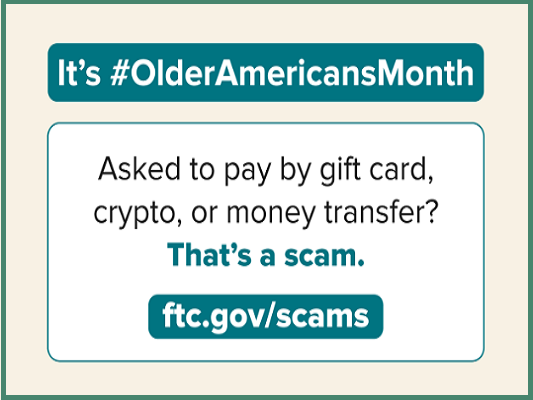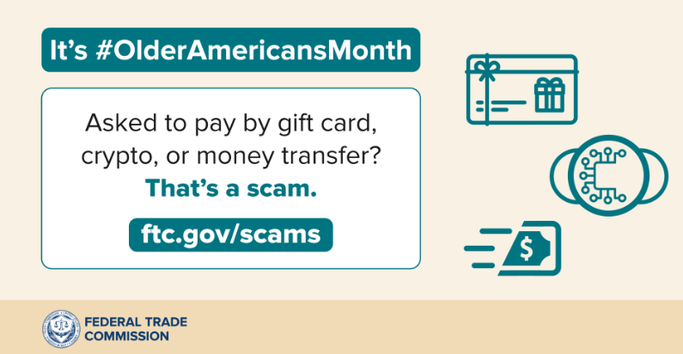|
May is Older Americans Month which is a good time to make sure credit unions have the tools in place to help prevent scammer’s from getting at your member’s money. There are a number of resources available to help educate your elder members from being victims of the numerous scams that are ongoing. Obviously, May isn’t the only month you should be having these conversations with staff and members – it is an ongoing conversation.
The Federal Trade Commission provided this consumer alert earlier this month that included several tips that older Americans can use to prevent being victims of scams, such as “Don’t pay with a gift card.” As discussed by the FTC, “Gift cards are for gifts. As soon as you tell someone the numbers on the back of the gift card, they get control of the card and your money is gone forever. No legitimate business or government agency will insist that you pay with a gift card.” These are handy tips that can be shared periodically with members, perhaps on social media or newsletters, to spread the word about scams and frauds. Additional resources from the FTC on common scams can be found here, including information on grandkid scams, techs support scams or the “you’ve won” scams, just to name a few. The National Credit Union Administration (NCUA) maintains a webpage on scams targeting older adults to help educate and spread awareness, which can be found here. As discussed by the NCUA, Older adults especially should be aware of fraud schemes for the following reasons:
More common scams and crimes are discussed and listed by the FBI here, including many scams that are targeted at anyone, such as business and investment fraud or business email compromise, to name two, but also more on elder fraud schemes, such as romance scams, home repair scams, family/caregiver scams, for example. The FBI link also includes tips for protecting oneself and how to report. These flyers from the Department of Justice can be posted at various locations throughout the community as a way to educate older Americans about common scams and also provide tips on how to avoid scams. The Department of Justice also has an interactive tool for elders who have been financially exploited to help determine to which agency they should report their incident, and a senior scam alert website. The senior scam alert website has a number of scams to warn and educate the public about trending elder fraud threats – this is good information to help educate members about the potential scams that are occurring. The Consumer Financial Protection Bureau (CFPB) provides a guide for family and friends of people living in nursing homes and assisted living communities, which can be found here. The guide discusses steps to protect friends and family from financial abuses, including how to prevent it from happening. This and additional resources can be found here, including how to order bulk copies for free. One of the additional resources is Money Smart for Older Adults. Staff can volunteer to share the Money Smart for Older Adults program with older members and caregivers to help them make informed financial decisions and protect against scams. The program includes an Instructor Guide, PowerPoint slides, and a take-home Resource Guide. The CFPB also has a age-friendly promotional toolkit for credit unions, found here, that includes additional information and resources on elder financial exploitation. Reminder - The Department of Justice, Office for Victims of Crime (OVC), created a free hotline for people to report fraud against anyone age 60 or older. The OVC explains the hotline is staffed by professionals who know how to support victims of fraud. Callers will reach a case manager who will help them through the reporting process at the federal, state, and local levels. Callers may also be connected with other resources on a case-by-case basis. Fraud and romance scams aimed at older adults resulted in losses of more than $184 million in 2018. Many crimes go unreported because victims are scared, embarrassed, or don’t know who to call. That’s why DOJ created the hotline. The Hotline’s toll-free number is 833-FRAUD-11 (833-372-8311) Training for Staff – FREE training is available from AARP’s BankSafe training which combines industry knowledge and experience with a state-of-the-art, online learning experience. AARP worked with more than 2,000 financial industry professionals to develop the training platform’s content and interactive scenarios. The platform is one of few designed specifically for frontline staff, supervisors and compliance officers. Find the platform here. After training there are also a number of tools and support resources - AARP BankSafe updates and maintains a network of tip sheets, reference materials, and state-specific resources. Two that caught my attention are the financial institution self-audit checklist and the trusted contact form. The trusted contact form is completed by the account holder and designates an individual to be their trusted contact is specified situations. If necessary, remember requirements to file Suspicious Activity Reports (SAR) as applicable. Another important piece of guidance was issued by the Financial Crimes Enforcement Network (FinCEN) in 2011 relating to filing SARs regarding elder financial exploitation which can be found here. Staff preparing SARs should be familiar with this advisory as it offers guidance on properly completing the SAR to assist law enforcement in its efforts to target instances of financial exploitation/abuse of the elderly. Remember, “if a financial institution knows, suspects, or has reason to suspect that a transaction has no business or apparent lawful purpose or is not the sort in which the particular customer would normally be expected to engage, and the financial institution knows of no reasonable explanation for the transaction after examining the available facts, including the background and possible purpose of the transaction, the financial institution should then file a Suspicious Activity Report.” As always, DakCU members may contact Amy Kleinschmit with any compliance related questions. Comments are closed.
|
The MemoThe Memo is DakCU's newsletter that keeps Want the Memo delivered straight to your inbox?
Archives
July 2024
Categories
All
|
|
Copyright Dakota Credit Union Association. All Rights Reserved.
2005 N Kavaney Dr - Suite 201 | Bismarck, North Dakota 58501 Phone: 800-279-6328 | [email protected] | sitemap | privacy policy |






